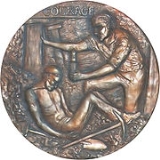
Edward Medal
Encyclopedia
The Edward Medal is a British civilian decoration which was instituted by Royal Warrant
on 13 July 1907 to recognise acts of bravery of miner
s and quarrymen in endangering their lives to rescue their fellow workers. The original Royal Warrant was amended by a further Royal Warrant on 1 December 1909 to encompass acts of bravery by all industrial workers in factory accidents and disasters, creating two versions of the Edward Medal: Mines and Industry.
In both case (Mines and Industry), the medal was divided in two grades: first class (silver) and second class (bronze), with the medal being a circular silver or bronze medal (as appropriate to the class awarded) suspended from a ribbon 1 3/8" wide and coloured dark blue and edged with yellow. Peculiarly, the cost of the Edward Medal (Mines) was borne by a fund established by a group of philanthropists (including prominent mine owners) and not the state.
The Edward Medal (Mines) has been awarded only 395 times (77 silver and 318 bronze) and the Edward Medal (Industry) only 188 times (25 silver and 163 bronze, of which only two were awarded to women), making the Edward Medal one of rarest British gallantry awards. Only posthumous awards were made after 1949, and the Edward Medal (Industry) (1st class) has not been awarded since 1948.
The Edward Medal was discontinued in 1971, when surviving recipients of the Edward Medal (along with holders of the Albert Medal
) were invited to exchange their award for the George Cross
. Nine (2 silver, 7 bronze) elected not to exchange their medals.
Royal Warrant
Royal warrants of appointment have been issued for centuries to those who supply goods or services to a royal court or certain royal personages. The warrant enables the supplier to advertise the fact that they supply to the royal family, so lending prestige to the supplier...
on 13 July 1907 to recognise acts of bravery of miner
Miner
A miner is a person whose work or business is to extract ore or minerals from the earth. Mining is one of the most dangerous trades in the world. In some countries miners lack social guarantees and in case of injury may be left to cope without assistance....
s and quarrymen in endangering their lives to rescue their fellow workers. The original Royal Warrant was amended by a further Royal Warrant on 1 December 1909 to encompass acts of bravery by all industrial workers in factory accidents and disasters, creating two versions of the Edward Medal: Mines and Industry.
In both case (Mines and Industry), the medal was divided in two grades: first class (silver) and second class (bronze), with the medal being a circular silver or bronze medal (as appropriate to the class awarded) suspended from a ribbon 1 3/8" wide and coloured dark blue and edged with yellow. Peculiarly, the cost of the Edward Medal (Mines) was borne by a fund established by a group of philanthropists (including prominent mine owners) and not the state.
The Edward Medal (Mines) has been awarded only 395 times (77 silver and 318 bronze) and the Edward Medal (Industry) only 188 times (25 silver and 163 bronze, of which only two were awarded to women), making the Edward Medal one of rarest British gallantry awards. Only posthumous awards were made after 1949, and the Edward Medal (Industry) (1st class) has not been awarded since 1948.
The Edward Medal was discontinued in 1971, when surviving recipients of the Edward Medal (along with holders of the Albert Medal
Albert Medal (lifesaving)
The Albert Medal for Lifesaving was a British medal awarded to recognise the saving of life. It has since been replaced by the George Cross.The Albert Medal was first instituted by a Royal Warrant on 7 March 1866 and discontinued in 1971 with the last two awards promulgated in the London Gazette of...
) were invited to exchange their award for the George Cross
George Cross
The George Cross is the highest civil decoration of the United Kingdom, and also holds, or has held, that status in many of the other countries of the Commonwealth of Nations...
. Nine (2 silver, 7 bronze) elected not to exchange their medals.

